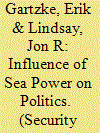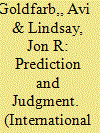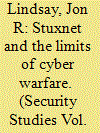|
|
|
Sort Order |
|
|
|
Items / Page
|
|
|
|
|
|
|
| Srl | Item |
| 1 |
ID:
120048


|
|
|
| 2 |
ID:
171987


|
|
|
|
|
| Summary/Abstract |
In theory, a fully functional quantum computer could break the cryptographic protocols that underwrite cybersecurity everywhere, which would be disastrous for national security, global trade, and civil society. Quantum cryptography, conversely, promises an unprecedented level of security, yet this benefit comes with some danger: revisionist actors with impenetrable communications might be able to conduct surprise attacks and covert conspiracies. In reality, neither of these threat scenarios are likely. Intelligence advantage in political competition depends on the interaction of technological infrastructure with organizational institutions. Robust cryptosystems can be undermined by poor organizational coordination, and careful security policy can compensate for technical vulnerabilities. Scientific innovation in quantum technology only affects one of these dimensions while potentially complicating the other. Even if the formidable engineering challenges of quantum computing can be overcome, signals intelligence collectors will still have to analyze a vast number of decrypts and deliver timely and relevant judgments to interested decision makers. The quantum networks of tomorrow, similarly, will provide little protection for complex organizations that have weak operations security practices. In the practice of intelligence, we should expect classical politics to dominate quantum computing.
|
|
|
|
|
|
|
|
|
|
|
|
|
|
|
|
| 3 |
ID:
136638


|
|
|
|
|
| Summary/Abstract |
Exaggerated fears about the paralysis of digital infrastructure and the loss of competitive advantage contribute to a spiral of mistrust in U.S.-China relations. In every category of putative Chinese cyber threat, there are also considerable Chinese vulnerabilities and Western advantages. China has inadvertently degraded the economic efficiency of its networks and exposed them to foreign infiltration by prioritizing political information control over technical cyber defense. Although China also actively infiltrates foreign targets, its ability to absorb stolen data is questionable, especially at the most competitive end of the value chain, where the United States dominates. Similarly, China's military cyber capacity cannot live up to its aggressive doctrinal aspirations, even as its efforts to guide national information technology development create vulnerabilities that more experienced U.S. cyber operators can attack. Outmatched by the West, China is resorting to a strategy of international institutional reform, but it benefits too much from multistakeholder governance to pose a credible alternative. A cyber version of the stability-instability paradox constrains the intensity of cyber interaction in the U.S.-China relationship—and in international relations more broadly—even as lesser irritants continue to proliferate.
|
|
|
|
|
|
|
|
|
|
|
|
|
|
|
|
| 4 |
ID:
175510


|
|
|
|
|
| Summary/Abstract |
Students of world politics have long shown a special interest in sea power. International relations, however, tends to treat the means of power as homogeneous and interchangeable. Are military capabilities largely undifferentiated goods, or do specific assets matter for politics? We argue that the characteristics of naval power offer distinctive tradeoffs in terms of the causes of war. Naval presence, firepower, and mobility enable naval nations to fight farther from home and obtain more diplomatic recognition. At the same time, mobility and stealth introduce ambiguity about national priorities and contribute to errors in assessing the local balance of power and resolve. We find empirically that disproportionate investment in sea power is associated not only with heightened diplomatic recognition and power projection across greater distances, as navalists expect, but also with increased instability in the form of a higher risk of dispute initiation. Disaggregating sea power by platform type—battleships, submarines, aircraft carriers—suggests similar tradeoffs across platforms as for navies generally. Sea power enables political leaders to intervene in distant locales, where their interests are more peripheral, and to reconsider their commitments, where their interests do not justify the risk. One counterintuitive implication is that offshore balancing strategies, which rely on sea power for deterrence, may actually be destabilizing.
|
|
|
|
|
|
|
|
|
|
|
|
|
|
|
|
| 5 |
ID:
186902


|
|
|
|
|
| Summary/Abstract |
The land, sea, air, space, and cyber domains have distinct operational characteristics. Specialization in the means of using or threatening force is not just a technical issue because choices to use different kinds of military instruments have political consequences. Conventional and nuclear capabilities in these domains have comparative advantages and disadvantages for three general types of strategy – coercion, warfighting, and deception. More complex strategies that cross or combine domains may achieve force-multiplying synergies or create significant trade-offs that affect military and political performance. This article describes the strategic constraints and opportunities posed by specialized force structures.
|
|
|
|
|
|
|
|
|
|
|
|
|
|
|
|
| 6 |
ID:
183648


|
|
|
|
|
| Summary/Abstract |
Recent scholarship on artificial intelligence (AI) and international security focuses on the political and ethical consequences of replacing human warriors with machines. Yet AI is not a simple substitute for human decision-making. The advances in commercial machine learning that are reducing the costs of statistical prediction are simultaneously increasing the value of data (which enable prediction) and judgment (which determines why prediction matters). But these key complements—quality data and clear judgment—may not be present, or present to the same degree, in the uncertain and conflictual business of war. This has two important strategic implications. First, military organizations that adopt AI will tend to become more complex to accommodate the challenges of data and judgment across a variety of decision-making tasks. Second, data and judgment will tend to become attractive targets in strategic competition. As a result, conflicts involving AI complements are likely to unfold very differently than visions of AI substitution would suggest. Rather than rapid robotic wars and decisive shifts in military power, AI-enabled conflict will likely involve significant uncertainty, organizational friction, and chronic controversy. Greater military reliance on AI will therefore make the human element in war even more important, not less.
|
|
|
|
|
|
|
|
|
|
|
|
|
|
|
|
| 7 |
ID:
120303


|
|
|
|
|
| Publication |
2013.
|
| Summary/Abstract |
Two big ideas have shaped recent debate about military doctrine: the Revolution in Military Affairs (RMA) and Counterinsurgency (COIN). These 'network centric' and 'population centric' worldviews appear contradictory, but this is a false dichotomy. American forces have actively developed RMA concepts in COIN environments during recent wars in Iraq and Afghanistan; the exemplar par excellence is innovation by US Special Operations Command (SOCOM) in doctrine, technology, and organization for counterterrorism. Ironically, SOCOM's reimagining of the RMA managed to both improve the strengths and underscore the weaknesses of the American military's technological prowess.
|
|
|
|
|
|
|
|
|
|
|
|
|
|
|
|
| 8 |
ID:
123391


|
|
|
|
|
| Publication |
2013.
|
| Summary/Abstract |
Stuxnet, the computer worm which disrupted Iranian nuclear enrichment in 2010, is the first instance of a computer network attack known to cause physical damage across international boundaries. Some have described Stuxnet as the harbinger of a new form of warfare that threatens even the strongest military powers. The influential but largely untested Cyber Revolution thesis holds that the internet gives militarily weaker actors asymmetric advantages, that offense is becoming easier while defense is growing harder, and that the attacker's anonymity undermines deterrence. However, the empirical facts of Stuxnet support an opposite interpretation; cyber capabilities can marginally enhance the power of stronger over weaker actors, the complexity of weaponization makes cyber offense less easy and defense more feasible than generally appreciated, and cyber options are most attractive when deterrence is intact. Stuxnet suggests that considerable social and technical uncertainties associated with cyber operations may significantly blunt their revolutionary potential.
|
|
|
|
|
|
|
|
|
|
|
|
|
|
|
|
| 9 |
ID:
140403


|
|
|
|
|
| Summary/Abstract |
It is widely believed that cyberspace is offense dominant because of technical characteristics that undermine deterrence and defense. This argument mistakes the ease of deception on the Internet for a categorical ease of attack. As intelligence agencies have long known, deception is a double-edged sword. Covert attackers must exercise restraint against complex targets in order to avoid compromises resulting in mission failure or retaliation. More importantly, defenders can also employ deceptive concealment and ruses to confuse or ensnare aggressors. Indeed, deception can reinvigorate traditional strategies of deterrence and defense against cyber threats, as computer security practitioners have already discovered. The strategy of deception has other important implications: as deterrence became foundational in the nuclear era, deception should rise in prominence in a world that increasingly depends on technology to mediate interaction.
|
|
|
|
|
|
|
|
|
|
|
|
|
|
|
|
|
|
|
|
|